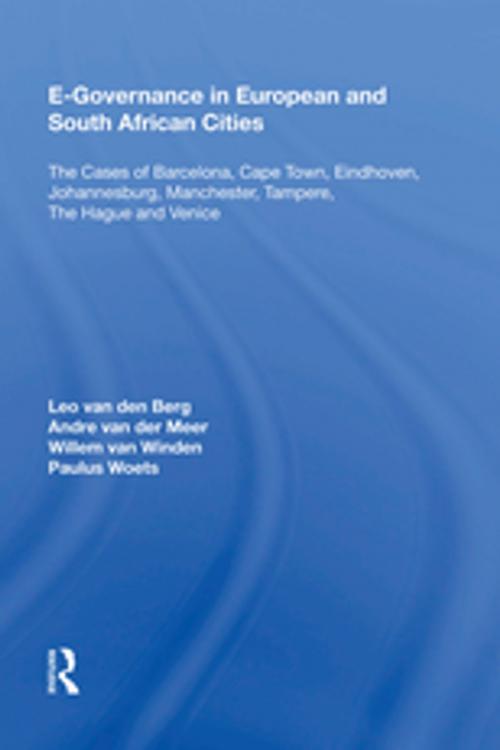E-Governance in European and South African Cities
The Cases of Barcelona, Cape Town, Eindhoven, Johannesburg, Manchester, Tampere, The Hague and Venice
Nonfiction, Social & Cultural Studies, Social Science, Sociology, Urban| Author: | Leo van den Berg | ISBN: | 9781351159142 |
| Publisher: | Taylor and Francis | Publication: | November 28, 2017 |
| Imprint: | Routledge | Language: | English |
| Author: | Leo van den Berg |
| ISBN: | 9781351159142 |
| Publisher: | Taylor and Francis |
| Publication: | November 28, 2017 |
| Imprint: | Routledge |
| Language: | English |
Since the late 1990s, city councils have become increasingly aware of the potential for information technologies (ICTs) to improve the management of cities and as an instrument for economic and social policy. This has resulted in a wave of urban ICT strategies and policies, such as the adoption of ICTs within the city administration itself, projects that facilitate access to ICTs by weaker social groups and policies to improve the urban electronic infrastructure. By comparing eight cities - Barcelona, Cape Town, Eindhoven, Johnnesburg, Manchester, Tampere, the Hague and Venice - this book examines a range of innovative urban e-governance strategies and develops a framework of analysis that permits a common approach. Throughout the book, a distinction is made between access policies (aimed at improving access to ICTs for all citizens), content policies (directed to improve the use of ICTs in the city administration and semi-public domains) and infrastructure policies (to improve the provision of broadband infrastructure). For each of the cities, e-strategies and policies are critically reviewed and compared. The book reveals that urban e-strategies have evolved from an internal and technology-centred orientation to a more outward-looking approach.
Since the late 1990s, city councils have become increasingly aware of the potential for information technologies (ICTs) to improve the management of cities and as an instrument for economic and social policy. This has resulted in a wave of urban ICT strategies and policies, such as the adoption of ICTs within the city administration itself, projects that facilitate access to ICTs by weaker social groups and policies to improve the urban electronic infrastructure. By comparing eight cities - Barcelona, Cape Town, Eindhoven, Johnnesburg, Manchester, Tampere, the Hague and Venice - this book examines a range of innovative urban e-governance strategies and develops a framework of analysis that permits a common approach. Throughout the book, a distinction is made between access policies (aimed at improving access to ICTs for all citizens), content policies (directed to improve the use of ICTs in the city administration and semi-public domains) and infrastructure policies (to improve the provision of broadband infrastructure). For each of the cities, e-strategies and policies are critically reviewed and compared. The book reveals that urban e-strategies have evolved from an internal and technology-centred orientation to a more outward-looking approach.















